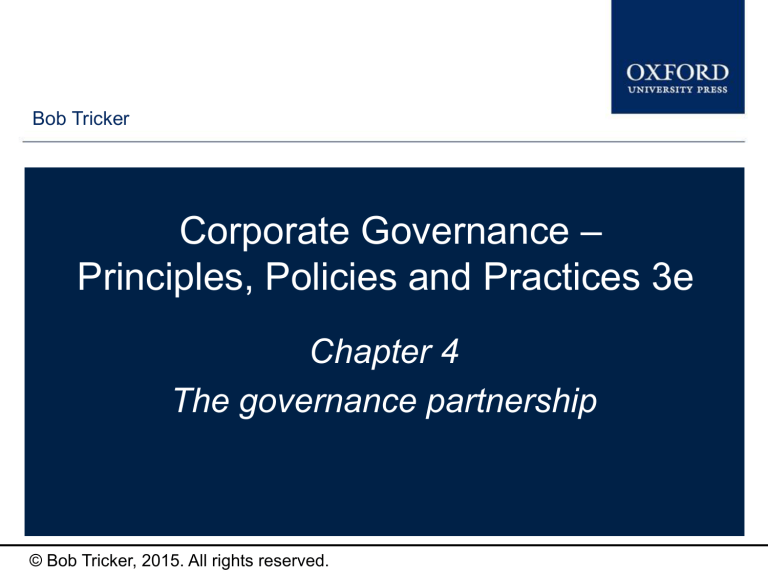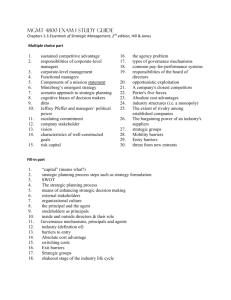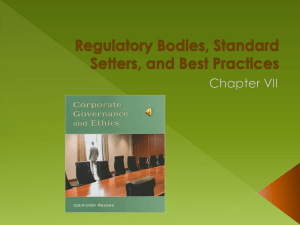
Bob Tricker
Corporate Governance –
Principles, Policies and Practices 3e
Chapter 4
The governance partnership
© Bob Tricker, 2015. All rights reserved.
The governance partnership
- In which we consider:
-
shareholder rights
shareholder stewardship and activism
shareholder information
different types of director
directors’ legal duties and rights
the board leadership role of the chairman
the corporate officers.
Tricker: Corporate Governance, 3rd edition
The governance partnership
Shareholder rights
• determined by company law and a company’s articles
of association,
• share ownership typically gives the right
– to receive notice, attend and vote at shareholders’ meeting
– to inspect the shareholder register and the register of
directors and officers
– to regular information
• But, having elected directors to govern the company,
shareholders do not have the right to be involved in
the day to day management of the business, nor to
inspect company records or management accounts.
Tricker: Corporate Governance, 3rd edition
The governance partnership
Shareholder stewardship and activism
• Advocates of shareholder democracy equate rights of
share ownership with responsibilities
• Shareholders, particularly institutional shareholders,
they argue, have a duty to be a watchdog over
corporate activities and possible excesses, for
example:
– challenging excessive director remuneration
– opposing schemes to protect the company and the
incumbent directors from predators
– highlighting unsatisfactory performance
• Some corporate governance codes call for such a
commitment.
Tricker: Corporate Governance, 3rd edition
The governance partnership
Shareholder information
• Most company law and corporate governance codes
encourage transparency in corporate matters and require
the reporting of specific information
• The OECD corporate governance principles call for timely
and accurate disclosure of
– all material matters regarding the company
– its financial situation, performance, ownership and
governance.
• Such transparency requires
– accurate accounting methods
– full and prompt disclosure of information regarding the
company
– disclosure of conflicts of interest of directors or
controlling shareholders.
Tricker: Corporate Governance, 3rd edition
The governance partnership
• Under the UK CG Code (2008) companies have to:
– explain the company’s business model and overall financial
strategy
– to report on the company’s strategy, risk management, and
governance procedures.
– show that remuneration incentives are compatible with the
companies risk profile
• Companies do not need to follow a specific template
in their presentation. Their report should describe the
company’s exposure to risk, explain how they are
identified, and outline the risk management systems
in place.
• Most listed companies now use websites as well as
hard-copy reports to convey shareholder information.
Tricker: Corporate Governance, 3rd edition
The governance partnership
• Some listed companies use road shows,
conference calls, webcasts and other internet
opportunities to communicate with
shareholders and the public
• Some companies have developed on-line
tools for readers to build their own reports
• An on-line stock exchange announcement by
a company can now trigger e-mail alerts,
media feeds and possible updating of
Facebook, YouTube and Twitter pages.
Tricker: Corporate Governance, 3rd edition
The governance partnership
Regularly updated standing information
about the company, its activities and
personalities can be used to de-clutter
and simplify the annual company report.
Tricker: Corporate Governance, 3rd edition
The governance partnership
Different types of ‘director’ and director
appointment
–
–
–
–
The appointment of directors
Cross-directorships
The chairman and chief executive roles
Board committees.
Tricker: Corporate Governance, 3rd edition
Directors and board architecture
Different uses of the title ‘director’
• Director
– executive director [ED]
– non-executive director [NED]
• Connected [CNED]
• Independent [INED]
• Outside director
• Managing Director
• Shadow director
• Nominee director
• Governing Director (Australia private company domination)
• Worker or employee director
• Associate director.
Tricker: Corporate Governance, 3rd edition
Directors and board architecture
• Independent NED
– a non-executive director with no relationship with
the company, other than the directorship, that
could affect the exercise of independent
judgement
• Connected NED
– a non-executive director with a connection to the
company.
Tricker: Corporate Governance, 3rd edition
Directors and board architecture
• Connected NED
- a non-executive director with a connection to the
company such as:
– retired executive of that company
– relative of the chairman or CEO
– nominee of a large shareholder
– representative of a significant supplier, distributor
or customer
– representative of a major financial partner
– retired partner of the firm’s auditor
- there could be good reasons for appointing to
board (experience, knowledge, contacts, but a
connected NED is not an independent NED).
Tricker: Corporate Governance, 3rd edition
Directors and board architecture
• Cross-directorships
Tricker: Corporate Governance, 3rd edition
Directors and board architecture
• Chairman and Chief Executive
• Should they ever be the same person?
– the arguments for and against
– what the codes say
– the practice in the USA
Tricker: Corporate Governance, 3rd edition
Directors and board architecture
• Board committees
• Standing committees of the main board
– The three committees in the codes
• Audit committee
• Remuneration Committee
• Nomination Committee
– Other board committees
• Executive or General Purposes committee
• Finance committee
• Compliance or corporate governance committee
• Strategy committee.
Tricker: Corporate Governance, 3rd edition
Directors’ Capabilities and
Responsibilities
The legal duties of a director
Directors’ responsibilities derive from the nature of
the joint stock limited liability company and are
enshrined in statute law, case law and regulation
Details vary by jurisdiction, but the essential duties
are:
• a duty of trust - to exercise a fiduciary responsibility
to the shareholders
• a duty of care - to exercise reasonable care, diligence
and skill.
Tricker: Corporate Governance, 3rd edition
Directors’ Capabilities and
Responsibilities
The legal duties of a director
The duty of trust
– Act honestly - for the benefit of members
– Show independence of judgement
– Avoid conflict of interest
– Act fairly
Tricker: Corporate Governance, 3rd edition
Directors’ Capabilities and
Responsibilities
The Nolan (UK) principles of public life
1. Selflessness - holders of public office should serve the public
interest, not seek gains for their friends
2. Integrity – they should not place themselves under financial
obligation to outsiders who might influence their duties
3. Objectivity – they should award public appointments and contracts
on merit
4. Accountability –they should submit themselves to the appropriate
scrutiny.
5. Openness – they should give reasons for their decisions.
6. Honesty – they should declare conflicts of interest
7. Leadership – they should support these principles by personal
example.
Tricker: Corporate Governance, 3rd edition
Directors’ Capabilities and
Responsibilities
The legal duties of a director
Act honestly - for the benefit of members
Exercise powers honestly in line with the company’s
constitution
Exercise powers in good faith, for the benefit of the
members in the short and long term
Recognise the need to foster business, to see the impact
of operations on communities and environment, and
maintain a reputation for good business conduct.
Tricker: Corporate Governance, 3rd edition
Directors’ Capabilities and
Responsibilities
The legal duties of a director
Show independence of judgement
A director has a duty to exercise independence of
judgement and not restrict his thinking or action.
Tricker: Corporate Governance, 3rd edition
Directors’ Capabilities and
Responsibilities
The legal duties of a director
Avoid conflict of interest
A director must disclose a personal interest in any
company transaction and abide by the board’s decision
on that interest
A director must not make a secret profit out of the
company
A director must not use any property, information or
opportunity from the company for his own benefit unless
allowed by the company’s constitution and disclosed.
Tricker: Corporate Governance, 3rd edition
Directors’ Capabilities and
Responsibilities
The legal duties of a director
Act fairly
A director’s duty is to act fairly between all the members of
the company
A director must recognise the interests of minority
Shareholders.
Tricker: Corporate Governance, 3rd edition
Directors’ Capabilities and
Responsibilities
The legal duties of a director
The duty of care
Exercise care, skill and diligence
A director must exercise the care, skill and diligence which
would be exercised by a reasonably diligent person
- with the knowledge, skill and experience expected of a
director
- and the knowledge, skill and experience which that
director has.
Tricker: Corporate Governance, 3rd edition
Directors’ Capabilities and
Responsibilities
Codification of Directors’ Duties
UK Company Act 2006
•
•
•
•
•
•
•
Duty to act within powers
Duty to promote the success of the company
Duty to exercise independent judgement
Duty to exercise reasonable care, skill, and diligence
Duty to avoid conflicts of interest
Duty not to accept benefits from third parties
Duty to declare interest in proposed transaction or
arrangement.
Tricker: Corporate Governance, 3rd edition
Directors’ Capabilities and
Responsibilities
A related party transaction is one between a company and
a party closely related to it, such as a director or a major
shareholder
– for example, the purchase by the company of a
property from one of its directors
Related party transactions provide good examples of the
requirement to disclose personal interests
The listing rules of most stock exchanges and securities
regulators require related party transactions to be
disclosed and, often, approved by the other shareholders.
Tricker: Corporate Governance, 3rd edition
Directors’ Capabilities and
Responsibilities
Insider trading, that is trading in a listed company’s shares
on the basis of privileged, share-price sensitive insider
information is a breach of a director’s fiduciary duty
It is also illegal in almost all countries
Japan, Hong Kong and Germany were among the last
countries to make insider trading a criminal offence
The United States has the most severe penalties for
insider dealing.
Tricker: Corporate Governance, 3rd edition
Directors’ Capabilities and
Responsibilities
• Directors have to be careful not to trade in their
company’s shares when they are in possession
of inside or privileged information such as the
company results just prior to publication and
before the stock market has that information
• The company secretary will often inform
directors when the window of opportunity for
trading in the company’s shares is open and,
more importantly, when it is closed.
Tricker: Corporate Governance, 3rd edition
Directors’ Capabilities and
Responsibilities
s.9(1) Securities (Insider Dealing) Ordinance
Insider Dealing Tribunal (Hong Kong)
Insider trading takes place:
When a person concerned with a corporation who is in
possession of information which he knows is relevant
information in relation to that corporation deals in any
listed securities of that corporation or their derivatives
(or listed securities of related corporation)
or counsels or procures another person to deal in such
listed securities knowing or having reasonable cause
to believe that such persons would deal in them.”
Tricker: Corporate Governance, 3rd edition
Directors’ Capabilities and Responsibilities
The US Sarbanes-Oxley Act 2002 (SOX)
• To strengthen corporate governance and restore
investor confidence following Enron, WorldCom and
others
• SOX imposed new accountability standards, with
criminal penalties, on directors.
• CEOs and CFOs must certify under oath that their
financial statements neither contain an ‘untrue
statement’ nor omit any ‘material fact’.
• Audit committees must be comprised totally of
independent outside directors.
Tricker: Corporate Governance, 3rd edition
Directors’ Capabilities and
Responsibilities
The US Sarbanes-Oxley Act 2002 (SOX)
• SOX also established new independence standards for
external auditors
• Areas of lucrative non-audit work by audit firms prohibited
• A Public Company Accounting Oversight Board (PCAOB)
created to oversee public accounting (auditing) firms and to
issue accounting standards
• Rules regulated by the SEC and apply to all companies
quoted in the United States, including overseas companies
listed there
• Sarbanes Oxley Act differentiated the United States from
many other countries by enshrining corporate governance
practice in law rather than voluntary codes.
Tricker: Corporate Governance, 3rd edition
Directors’ Capabilities and
Responsibilities
The US Sarbanes-Oxley Act 2002 (SOX)
• SOX has proved expensive to operate,
particularly section 404
• Some overseas companies have complained
about the potential extra-territorial legislation
• Others have withdrawn from listing in the
United States.
Tricker: Corporate Governance, 3rd edition
Directors’ Capabilities and
Responsibilities
UK Companies Act 2006
• Clarified directors' duties for the first time in
statute law
• Made clear that directors have to act in the
interests of shareholders
• But added that in acting in the shareholders'
interests, they must pay regard to the longer
term interests of employees, suppliers,
consumers, and the environment.
Tricker: Corporate Governance, 3rd edition
Directors’ Capabilities and
Responsibilities
UK Companies Act 2006
• Encouraged narrative reporting by companies calling
for them to be forward-looking, identifying risks as
well as opportunities
• Quoted companies have to provide information on
environmental matters, employees and social and
community issues
• This business review must include information on any
policies relating to these matters and their
effectiveness, plus contractual and other
relationships essential to the business.
Tricker: Corporate Governance, 3rd edition
Directors’ Capabilities and
Responsibilities
UK Companies Act 2006
• Promotes shareholder involvement in governance by
enhancing the powers of proxies
• Makes it easier for outside investors to be informed
and exercise governance rights in the company
• Allows shareholders to limit the auditors' liability to
the company to what is fair and reasonable
• Requires institutional investors to disclose how they
used their votes
• Introduces a new offence for recklessly or knowingly
including misleading, false or deceptive matters in an
audit report.
Tricker: Corporate Governance, 3rd edition
The governance partnership
We have considered:
- shareholder rights
- shareholder stewardship and activism
- shareholder information
- different types of director
- directors’ legal duties and rights
- the board leadership role of the chairman
- the corporate officers.
Tricker: Corporate Governance, 3rd edition



